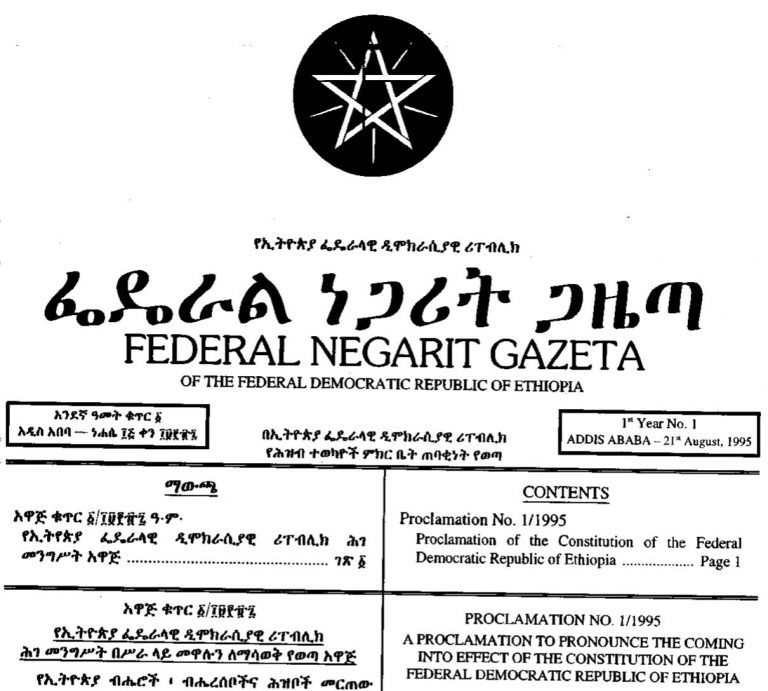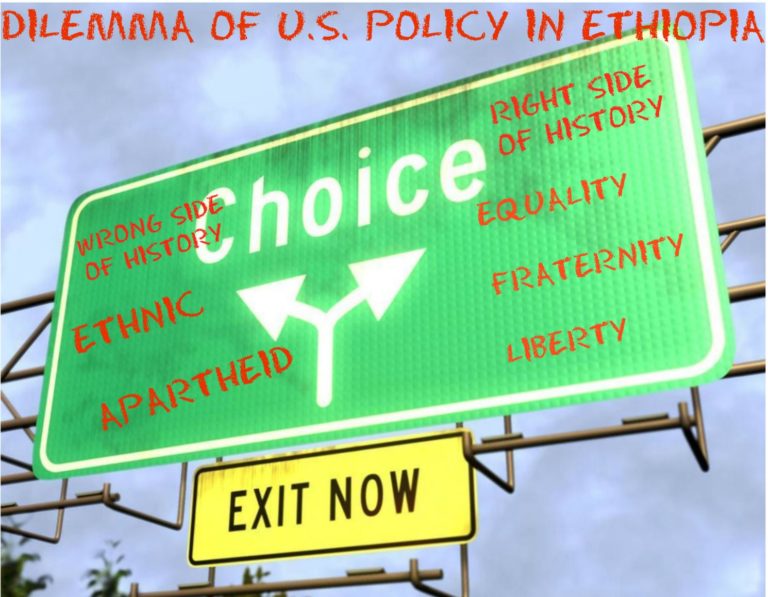To Save Ethiopia From Civil War, Solutions Must Work From the Ground Up
 BY ALEMAYEHU MARIAM, OPINION CONTRIBUTOR — 02/21/18 02:30 PM EST 20
BY ALEMAYEHU MARIAM, OPINION CONTRIBUTOR — 02/21/18 02:30 PM EST 20
Originally Posted on The Hill on 02/21/18
http://thehill.com/opinion/international/374900-to-save-ethiopia-from-civil-war-solutions-must-work-from-the-ground-up
Ethiopia teeters on the edge of a precipice. For the past two years, waves of defiant public protests have made the country ungovernable and posed an existential threat to the ruling party that has been in power since 1991.
The current crisis has roots in closure of political space, increasing repression and uncompromising one-party rule in the country. In the 2010 parliamentary election, the ruling party claimed 99.6 percent of the seats and 100 percent of the seats in 2015. In October 2016, regime forces used deadly force in which over a 1000 people were killed and tens of thousands detained by security forces. The regime blamed “anti-peace elements” and Diaspora-based Ethiopian opposition groups for the unrest.
The two largest ethnic groups — the Oromos and Amharas — feel marginalized, underrepresented and powerless. Ahmed Salim, VP at Teneo Global, explains:
“Much of the public anger stems from the fact that the Tigryan ethnic group, representing 6 percent of the population, control key business interests, hold senior level positions in government and the military, and own significant land at the expense of other ethnic groups.”
The regime has dealt with the unrest as a policing problem that requires quick suppression, which has resulted in deadly clashes with protestors and new cycles of anti-government protests and actions. To placate protesters, government authorities announced “anti-corruption reforms, cabinet reshuffles, a dialogue with handpicked opposition political parties, promised to create jobs for youth and pledged commitments youth job creation, and commitments to improve good governance.”
But the best laid plans of men went awry when Ethiopian Prime Minister Hailemariam Desalegn suddenly resigned last week. Desalegn’s resignation raised a few eyebrows but not alarm. He is generally regarded as a pawn of Ethiopia’s dominant party, the Tigrayan Peoples Liberation Front (TPLF). In July 2017 Desalegn himself said that in the prime minister’s office he often had to make decisions without adequate and firm information.
In a televised statement, Desalegn said his resignation would lead to “lasting peace” and is “vital in the bid to carry out reforms that would lead to sustainable peace and democracy.” He declared “the public’s demands and questions should be met and answered”.
But what are the people’s demands and questions? The release of political prisoners is at the top of the least. More than 6,000 political prisonershave been freed since January even though thousands remain imprisoned.
The public’s demands and questions for freedom, democracy and human rights were definitively answered by a declaration of a six-month state of emergency the day after Desalegn’s resignation. The first state of emergency, which lasted 10 months ended in August 2017, did not end the wave of anti-government protests. Could this one be a precursor to a declaration of full martial law?
The U.S. issued a statement “strongly disagreeing with the Ethiopian government’s decision to impose a state of emergency that includes restrictions on fundamental rights” and urged the government to expand “the space for meaningful dialogue and political participation that can pave the way to a lasting democracy.” The European Union in a statementurged the new government to address the “grievances of the population” and stated “only a constructive dialogue among all stakeholders — authorities, opposition, media, civil society — will allow for a peaceful and durable resolution of the crisis.”
Can Ethiopia be saved from the edge of the precipice?
I believe Ethiopia is in the terminal stage of state failure. State failure is measured on a triple benchmark of representation, security, and attention to the welfare of citizens. A leading scholar argues a state that is unable to provide “positive political goods” to its people “loses legitimacy and, in the eyes and hearts of a growing plurality of its citizens, the nation-state itself becomes illegitimate.” Civil war has been a predictable outcome of state failure in Africa.
Ethiopia today is on the precipice of state failure and faces the abyss of interethnic civil war. The regime has no legitimacy in the eyes of much of the population.
It is possible to pull Ethiopia from the brink by an internationally mediated or broad-based national reconciliation process?
I recently proposed a reconciliation process utilizing traditional Ethiopian conflict resolution mechanisms which could produce a negotiated compromise for power sharing, a transitional government and free and fair new elections. I have cautioned against an externally imposed reconciliation which sidelines ordinary citizens to mere spectators.
That does not mean the U.S., or the U.N. could not mediate a reconciliation process.
Ethiopia, the second most populous country in Africa, is a U.S. partner in the U.S. global war on terrorism and has benefitted from U.S. aid. The U.S. has long sought to promote reconciliation in Ethiopia and would have wide acceptance among diverse stakeholders as a mediator. In 2006, then-Deputy Assistant Secretary of State Donald Yamamoto testifyingbefore Congress said:
“On numerous occasions, the Assistant Secretary sent me to Addis Ababa to work with the Ethiopian Government and opposition groups in support of U.S. Embassy efforts to encourage a reconciliation of differences between the opposition and the ruling parties, and to discuss ways to improve the political process with the Ethiopian government.”
Yamamoto is currently acting assistant secretary of State for African Affairs and is best suited for the job of mediation.
In December 2017, former U.S. Assistant Secretary of State and ambassador Herman Cohen called for the start of a “reconciliation process” through broad public participation which includes “women, youth, the press” and other marginalized groups. Cohen was instrumental in facilitating the ruling regime to ascend to power in 1991.
Yamamoto and Cohen could coordinate an orderly transitional government for national reconciliation.
But time is running out for Ethiopia and the point of no return nears.
Alemayehu (Al) Mariam is a professor of political science at California State University, San Bernardino, with research interests in African law and human rights. He is a constitutional lawyer and senior editor of the International Journal of Ethiopian Studies.






